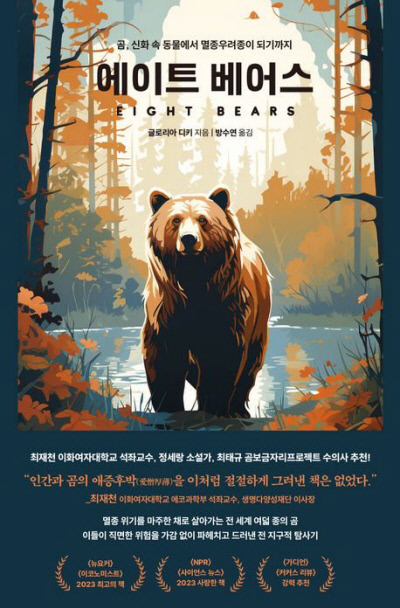
,
,
, Eight Bears,
, By Gloria Dickie | Translated by Bang Soo-yeon,
, Arle | 436 pages | 22,000 won,
,
, ‘If you were to summarize the current situation of bears and humans in one line, there wouldn’t be a more precise statement than ‘everyone is in trouble together.’ This sentence is the title of the prologue of Eight Bears.’
,
, ‘There are only 8 species of bears in the world today: giant pandas, spectacled bears, sloth bears, sun bears, sloth bears, American black bears, brown bears, and polar bears. Each of these 8 species has unique characteristics and faces different situations. Some bears are excessively loved (giant pandas), some are exploited (sloth bears), some are objects of fear (sloth bears, American black bears, brown bears).’
,
, ‘Gloria Dickie, a special correspondent for environmental issues at Reuters, does not simplify the relationship between bears and humans in Eight Bears as victim (bears) and perpetrator (humans).’
,
, ‘The bear that best represents the complexity of the issue that the author wants to convey seems to be the sloth bear from India. Sloth bears are very aggressive. Many people in India have suffered terrible injuries or even death from sloth bear attacks while simply walking down the street. Sloth bears are not carnivorous, and their preferred food includes ants and fruits. So why do such incidents occur?’
,
, ‘Sloth bears are in a position where they have to survive by fighting against other predators in India, such as tigers and leopards. Unlike brown bears and polar bears that are at the top of the food chain, sloth bears, who highly value their offspring, would not have lived near tigers if ‘human intervention did not exist.’ However, as the Indian government prioritized securing tiger habitats for wildlife protection, sloth bears have been pushed closer to where humans live, suffering harassment from tigers. Conflict with humans was inevitable from the beginning. The book also mentions cases where residents, exhausted from sloth bear attacks, angrily kidnapped and confined sloth bear cubs, refusing to release them until the government came up with a solution.’
,
, ‘It is easy to advocate for the protection of cute bears like pandas. However, nature is sometimes fierce and brutal. Humans themselves must coexist with the terrifying aspects of ‘nature’ as part of it.’

